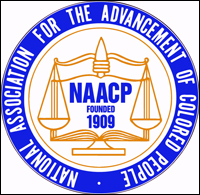Back in 1993 the NY Times ran a story on how the N.A.A.C.P. was facing a battle over its future. You know, the NAACP, one of the oldest civil rights organizations in the country. Founded in 1909. Yeah, it played a leading role in opposing lynching laws and legal segregation until the demise of Jim Crow three decades ago. Today it is struggling to be relevant to most African Americans. Many young political activists, bloggers and just plain old black folks see the NAACP as irrelevant. I can see why black bloggers like Francis L. Holland are concerned with the NAACP leaderhip and it's future. Also, back in 1993, the new head of the NAACP, Rev. Dr. Ben Chavis didn't waste any time furthering the causes of the nation's oldest civil rights group, mapping out strategies to deal with environmental waste hazards in Black communities, racial tension in Los Angeles and extending membership to other minorities.He left the NAACP after he used NAACP funds to settle a sexual harassment suit. Then there was 1995, when the NAACP searched for a leader to replace then outgoing president Kweisi Mfume, the nation's oldest and largest civil rights organization, which some said was at a crossroads, a changing of the guard that would redefine its identity with younger black Americans who, unlike their parents, do not immediately think of the group when they think of civil rights. Mfume, who is credited with bringing financial stability and credibility to an organization reeling from scandal and mismanagement when he took over announced his resignation, saying he wanted to spend more time with his family. at the time, Mfume dismissed persistent rumors among the organization's membership that he was forced out because of a rift between himself and Chairman Julian Bond. Mfume had no role in a nine-member committee that Bond assembled to find his successor. Then in 2005, there was Bruce Gordon, who in became the new chief executive of the National Association for the Advancement of Colored People, a former telecommunications executive. Mr. Gordon succeeded Kweisi Mfume. I'm reminded of an interview with Bruce Gordon, when he said: "I think that what we first do is attract 20- to 35-year-olds because they are underrepresented in the membership base of the organization and therefore underrepresented in the leadership of the organization. I think I have some ideas on how to do that. And as we do that, we're going to start to broaden the focus, not change the focus but broaden the focus to address issues that this particular demographic cares about. And as that happens, I believe we will find a more vibrant NAACP, a more relevant NAACP, and then maybe we can start to deal with the children in the schools that you've heard are visited." Bruce Gordon abruptly resigned as President last year.  That was then, this is now. Now, in 2008, The NAACP Board named a new President and CEO following last year's abrupt resignation of former president Bruce Gordon. The National Association for the Advancement of Colored People has chosen 35-year-old Ben Jealous to lead the organization.  Benjamin T. Jealous, National President-CEO NAACP Now the word on the street is that the NAACP Chairman, Julian Bond is thinking about not resigning from the Chairmanship of the NAACP. Yes, Julian Bond is reconsidering his plan to step down as
Many are wondering if a bunch of the old guard national board members are asking Julian to reconsider? This writer hopes not. I agree with Julian Bond when he said, "This is a time for renewal. ... The country has a new president in Barack Obama; the organization has a new CEO in Benjamin Jealous, and we'll soon have a new chairman of the NAACP board." AAPP: I also am well aware of Mr. Bond's great work back in the day, but, Mr. Bonds vision is blurred in many ways, not just by father time, but also due to changes in the black community. It's time for Mr. Julian Bond and other old-timers to step aside and let a new NAACP board and leadership rise. Benjamin T. Jealous needs to be able to address the issues that political analyst Earl Ofari Hutchinson noted sometime ago, when he wrote: "The NAACP became the political springboard for this fast emergent black middle-class ... But these battles do not have the remotest bearing on the lives of the black poor. They have grown more numerous, more desperate, trapped in segregated or re-segregated neighborhoods plagued by crime, drugs, and gangs. They shuttle their children off to abominably failing public schools, or are stuffed into bulging jail cells ... The NAACP can reclaim its cutting edge leadership and activism by mounting a no-holds barred assault on such problems as the glaring iniquities in the imposition of the death penalty, the racially skewed mandatory drug sentencing laws, the HIV/AIDS epidemic, the lack of comprehensive health care for the poor, and grossly underserved, under-performing inner city schools, and chronic double digit black joblessness." Now I understand that NAACP CEO Benjamin Jealous said in a statement that the civil rights organization looks forward to Bond's continued active involvement. That's all well and good, but if Benjamin T. Jealous is to be successful he needs to be able to address the needs and issues of people that political analyst Earl Ofari Hutchinson said are "trapped in segregated or re-segregated neighborhoods plagued by crime, drugs, and gangs. They shuttle their children off to abominably failing public schools, or are stuffed into bulging jail cells."These are some of the issues the current National NAACP Board and Bond have refused to address for many years. Read more of the post at: African American Political Pundit.com |
Friday, December 5, 2008
The N.A.A.C.P. Still Facing a Battle Over Its Future
Subscribe to:
Post Comments (Atom)









0 comments:
Post a Comment